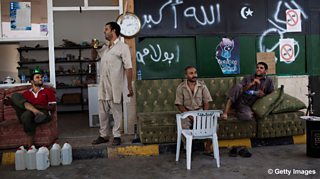Building a new Libya
Karen Wespieser
Research Manager, Middle East and North Africa for Βι¶ΉΤΌΕΔ Media Action
Tagged with:
Three years on from the fall of Muammar Gaddafi's regime, Libya is still experimenting with democracy and for a researcher like me, this makes it a fascinating place. On 17 February Libyans celebrated 'revolution day' and yesterday went to the polls to choose a commission to draft a new constitution. The number who cast their vote is expected to be low – a fact that makes Βι¶ΉΤΌΕΔ Media Action's work in Libya even more challenging.
Libyas new constitutional commission will be made up of 60 members, with equal representation for Libya's three regions. The commission will have a mandate to draw up a new constitution to cover key issues such as Libya's system of government, the status of minorities and the role of Islamic Sharia law.
As part of its governance work, . Our governance work aims at facilitating greater transparency in political decision-making, deepening the democratic process and encouraging a culture of transparency and accountability.
Built on research
Last summer, we commissioned a national survey of Libyans asking them amongst other things for their opinion on the constitution building process. In total we surveyed 1,146 people from all 22 districts of the country, in order to produce robust national results.

The survey – conducted by research agency – confirmed that the constitution is an important issue for the Libyan people. Unsurprisingly, the main issue identified by respondents at the time of the survey was security. However the constitution was the seventh most mentioned national issue.
The survey also found a strong level of interest in the constitution making process (67.6% of respondents said that they were 'interested' or 'very interested'), and a belief that all Libyans should be involved in it (30.3% of respondents said 'all Libyans' should be involved, compared to the 25.3% who said 'academics' should be involved and 20.2% who said 'lawyers' should be involved).
In fact many respondents (65.1%) said that they would like to have the opportunity to express their opinion about the constitution-making process.
Despite this, there seems to be a high level of political apathy in the country. The election commission has reported that only 436,000 Libyans out of an eligible 3.4 million had signed up to vote before the deadline.
Key findings
The survey found that Libyans rarely discuss the constitution with other people (52.3% reported 'never' discussing it).
In our research this is a key finding as we believe that the extent to which people discuss issues of governance – going beyond media consumption to interact with issues and other people in their local context – is a key determinant of efficacy and action.
The survey also found that the majority of Libyans (59.8%) claim to know 'nothing at all' about the constitution making process.
However, the survey does suggest that Βι¶ΉΤΌΕΔ Media Action's work in the country will contribute to changing this.
Of the respondents who said that that they did know something about the constitution making process, nearly half (46.7%) reported that their main source for this information was television. Furthermore, television was especially important as a source of information for women and younger people.
Βι¶ΉΤΌΕΔ Media Action will be sharing this data with and working with the state broadcasters to help provide the information about the constitution that the people are demanding. A full report based on the data collected in the survey will be available shortly.
Related links
Follow Βι¶ΉΤΌΕΔ Media Action on and
